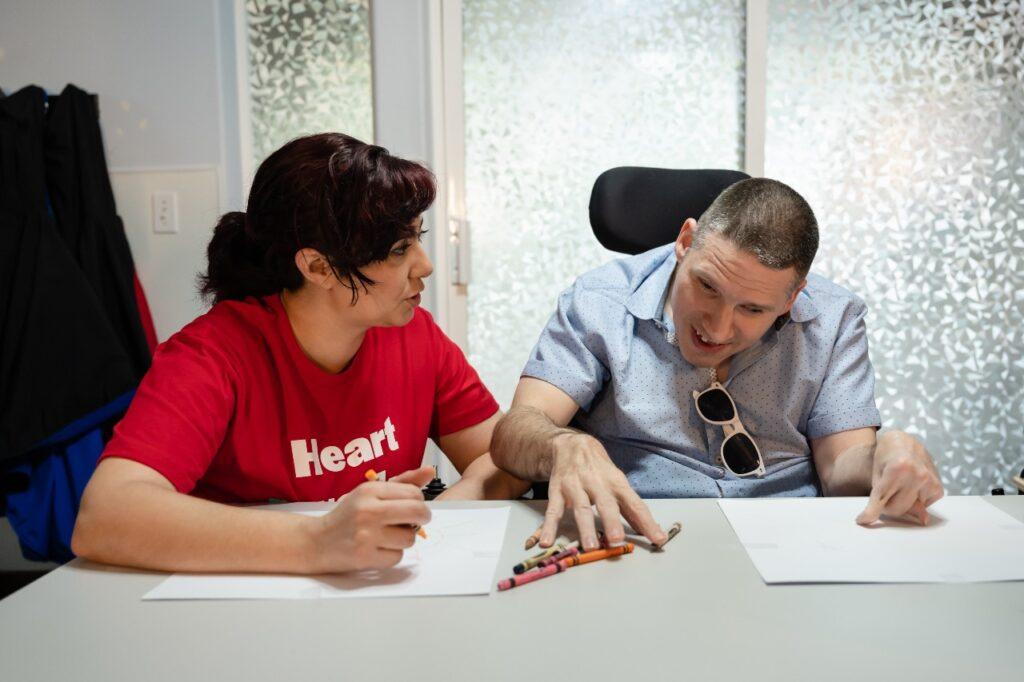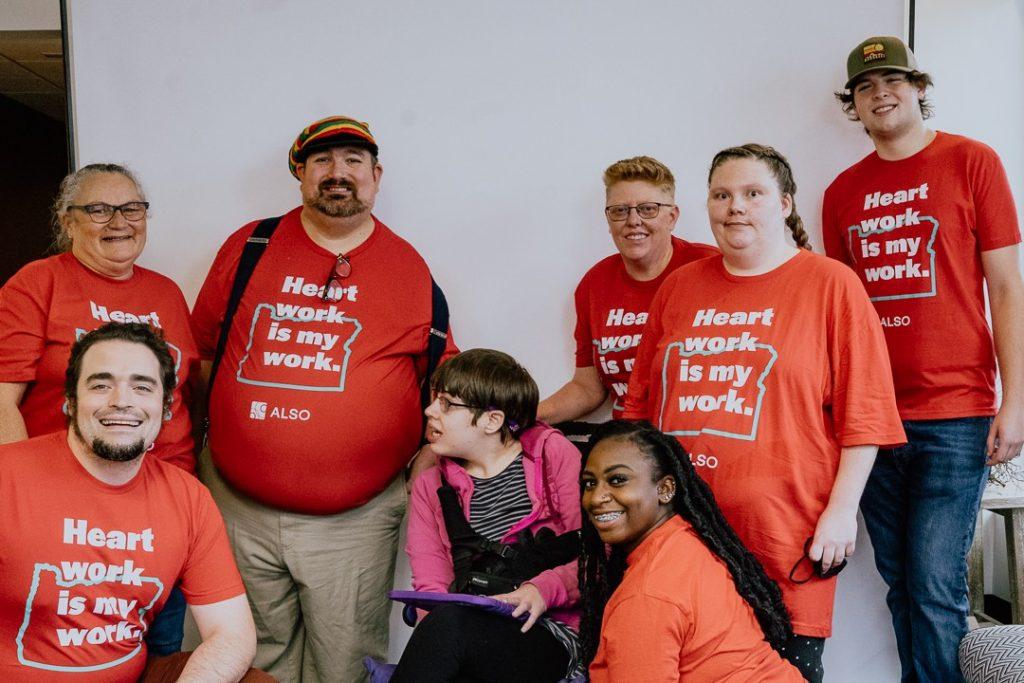Explore the ALSO Children’s Homes Wishlist and help fill the season with joy for the children supported by ALSO.
Explore the ALSO Children’s Homes Wishlist and help fill the season with joy for the children supported by ALSO.

If you’re a loved one of someone with a disability, you know the importance of long-term financial planning that allows them to afford the many resources they need to live their lives in comfort, safety, and health. It wouldn’t be surprising if you were overwhelmed at how to manage the related financial complexities, especially if you’re a parent or guardian. You may be asking questions like:
At ALSO, we are Advocates for Life Skills and Opportunity. We hear these concerns from those with intellectual and developmental disabilities (I/DD) and their families loud and clear. We’re here to help you in the journey of effective financial planning for your loved one with disabilities.
Financial planning can be described as a comprehensive look into household assets, costs, and resources. It includes long- and short-term finances. All financial plans should be finalized in a written document and should be reviewed on a periodic basis for any necessary changes.
We can all agree that having enough financial resources to meet our family’s needs can be complicated. If a child or an adult family member is living with disabilities, the challenges are extra tough. Depending on the state that we live in, raising a child with disabilities can cost up to ten times higher than raising a child without a disability.

For parents and guardians of children with disabilities, it’s not just about having the financial resources for medical expenses or therapy. It’s about all the costs related to helping them to achieve a better life experience—living a safe, productive, and satisfying life.
Thanks to better medical and health care for individuals with disabilities, most will outlive their parents, requiring more care later in life. The team at ALSO is well-versed in these realities. Let’s delve into these and other unique financial needs of children and adults with disabilities.
For most families, if a child gets sick or has an accident, there are additional medical expenses in terms of testing, medicines, and therapy. But for children with disabilities, these needs are likely life-long and must be incorporated into every aspect of a child’s life, including school, work, recreation, and activities of daily living (ADLs). Some research has indicated that children with Down syndrome are hospitalized overall at a rate five times higher than the general population.
Assistive technology has been a transformative experience for millions with disabilities. It’s now much more possible for people to live independently, work and play in the community, and get an education. Check out these examples of assistive technology:
Even though this technology can in the long-term save money for families and governments by decreasing the need for large institutions and paid caregivers, the initial financial investment can be extremely expensive. Public and private insurance often does not cover these life-changing devices, creating major financial challenges for families.
Other challenges include modifications to homes and vehicles. Children need to get to school to learn, and to their health care appointments to remain healthy. Ramps must also be installed for safe entry into homes as well as accessibility. There are numerous types of technology that help people with disabilities feel more independent in their homes:
LEARN MORE: Sam’s Home Tour
The impact of caregiving on family income and savings is massive. Research on four national surveys estimate that households that include one adult with a work disability require an average of 29% greater income to maintain the same standard of living as those households that don’t include someone with disabilities. Also, meeting their child’s needs and providing caregiving responsibilities means that someone is prevented from entering the workforce so they can earn money for the household.

So, as committed and loving family members, how do we ensure our child’s needs are met, and that they get the best opportunities in life? How do we make this happen for all our children, disability or not? After all, everyone, on some level, has unique needs and strengths.
If we said that financial planning was an easy process, we’d be hiding several important realities. But with tenacity, thoughtful preparation, and a positive mindset, you’ll likely discover there’s a lot you can do to brighten your child’s financial future.
By ‘overarching’ we mean financial plans that include long- and short-term goals. For example, consider your child’s needs for the upcoming school year – in addition to what they might need for their education in the future. We strongly advise that families think of it as a fluid document that changes as family needs change. Therefore, it should be regularly reviewed and updated. A certified financial planner with additional expertise in disability benefits can be extremely beneficial.
Many people with disabilities find themselves between a ‘rock and a hard place’ when it comes to receiving Social Security Disability Insurance (SSDI), Supplemental Security Income (SSI) or other disability benefits. There are often caps as to how much you can receive, but also be able to save in an account for future expenses. In the past, these rules unfortunately led to people with disabilities and their families having to cope with impoverishment, because if they earned above a certain amount, they would lose certain benefits.
This is where the ‘Achieving a Better Life Experience Act’ (ABLE) comes in. It was passed in 2014 to allow eligible individuals to save as much as $17,000 or more.
There are several benefits of ABLE accounts.
Eligibility requirements and contribution limits vary from state to state. If someone is receiving federal benefits such as SSI and/or SSDI, they are automatically eligible. One major upcoming change to eligibility is the ABLE Adjustment Act, which changes the age of significant disability onset for qualified individuals from before age 26 to before age 46.
LEARN MORE: How to Save Money While on Disability: Open an Oregon ABLE Account
For our family members with and without disabilities, we often think mainly of health insurance (such as Medicaid and Medicare). But there are other types of insurance that are particularly beneficial for children and adults with disabilities.
It’s easy to get overwhelmed by the day-to-day challenges of family expenses. However, any solid financial plan should address long-term estate planning.
A comprehensive plan considers multiple scenarios that allow parents or guardians to coordinate the finances of the person with a disability. Such measures will ensure the care of family members (with and without disabilities) continues if parents/guardians pass away or become unable to make financial decisions. A third-party trust is an option that allows someone besides your relative with a disability to manage their finances if needed.
Although not unfixable, try to avoid these common mistakes:
With good tax planning, possibly from a financial advisor, you can adopt several strategies for tax-advantaged savings that minimize tax burdens. Some examples include reimbursement for medical expenses, dependent care credits, and disability tax credits. Additionally, there are many ways to minimize tax burdens. It is best to reach out to a tax expert to discover these possibilities.
SSI and SSDI are great government resources for people with intellectual and developmental disabilities. Learn about the difference between the two, eligibility requirements, and how to apply for each in our comprehensive resource found here.
Every family needs an advocate in their corner. ALSO’s Francine Marsh, our Social Security and Disability advocate, is that person. She has extensive expertise in government assistance programs, Social Security Administration regulations, grant opportunities, and nonprofit organizations. She is a great resource for people that need assistance accessing social security. Want to talk to Francine? Give her a call at (541) 678-0343.
One of the best things families can do is to build a financial support network that includes experts, disability advocates, and other families with loved ones living with disabilities. Knowledge-sharing about government programs, specific support in your area, and individuals who can be empathetic to your needs can help you navigate the complex world of financial planning.
Sometimes, no matter how hard we try, we can’t get the support we need from the usual channels for government benefits and other supplemental needs for our child or adult with disabilities. Depending on the area, there are community resources which may help fill in the gaps. For example, the Oregon Department of Human Services has information about numerous community developmental disabilities programs. Their advisory services will help you connect with the organizations throughout the state.
Additionally, family networks in Oregon are a resource that we are lucky to have. The Oregon Consortium of Family Networks (OCFN) is made up of six organizations and “supports families to become healthier family units, stronger advocates for their children, and active in their communities.” OCFN can help families map out a life for their children and themselves, have meaningful relationships and experiences, and connect them with helpful resources.
Nonprofit organizations are known for being laser-focused on their Mission and Vision, like ALSO. In addition to being agile and innovative, they are extremely knowledgeable about public benefits, grant opportunities, and private resources.
LEARN MORE: About the Staff at ALSO
Each professional that comes into contact with your family member with disabilities will likely have excellent advice that will lay the framework for present and future disability needs. Healthcare professionals with specific clinical expertise (e.g. autism spectrum disorder, Down’s syndrome, cerebral palsy) are important members of the collaborative team.

ALSO is one of Oregon’s nonprofit disability support service providers, serving individuals with I/DD throughout the state. We provide person-centered care with the long-term goal of full community inclusion for the people we support. We know how important it is to get the right kind of care for your loved one with disabilities. Let us help in any way we can and learn more about our services today!
Want to ensure organizations like ALSO have the resources they need to carry on their mission for generations? Planned giving is a great was to support this. Donate to our nonprofit today to help make a positive impact!

Sign up for our newsletter to get our latest news, content, and job opportunities.
Help us ensure that everyone has the same opportunities in their home, workplace and community. Let’s make dreams!
